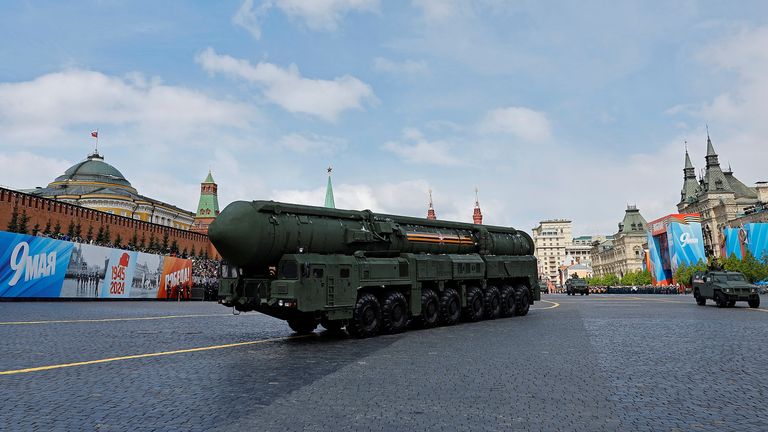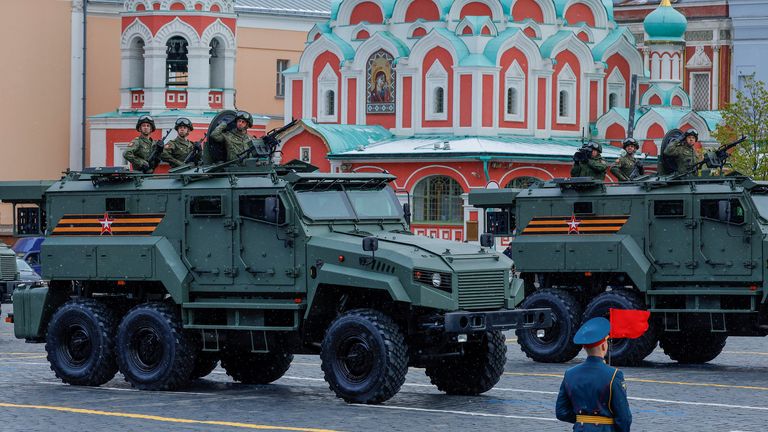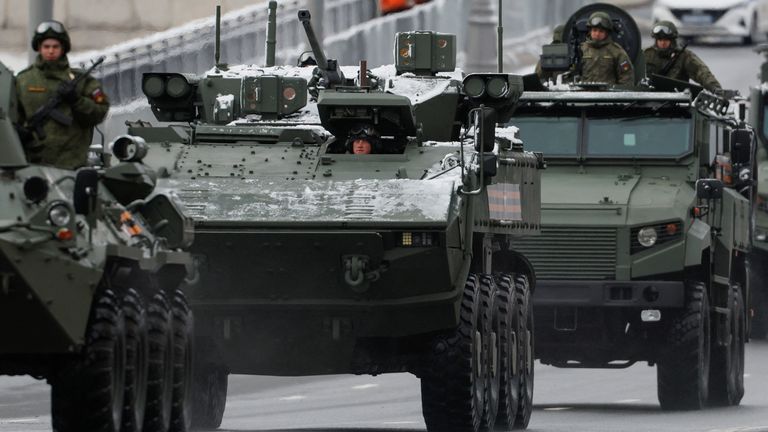Vladimir Putin's Victory Day parade is another attempt to display might despite increasing isolation
Every year on 9 May, Russia celebrates Victory Day to mark the country's defeat of Nazi Germany in the Second World War - the parade remains an important part of the country's national identity as well as an attempt to show off its military might.
Thursday 9 May 2024 14:16, UK
The ground actually shuddered as the intercontinental ballistic missile launchers thundered past.
They were the final flourish of a 61-strong line-up of military hardware, and seeing the colossal Yars system up close was unnerving to say the least.
And that's the point. This was a demonstration of military might and menace.
But those watching on in the Red Square lapped it up. Perhaps it's no surprise they have been immersed in a narrative which presents these weapons of mass destruction as tools to secure peace.
"It's wonderful," Olga told Sky News. "We have a great country, we have a great army and, of course, a great people.
"When our soldiers march across the square, our hearts beat in time with their steps."
The crowd were offered blankets against the snow and icy wind. While the parade offered a cloak of pomp and patriotism, as a means to justify Russia's current path of aggression.
There were periodic roars of "hurrah" from the phalanxes of troops; goose-stepping soldiers marched with mesmerising precision; and the military bands pumped out war songs at a volume so loud one could feel the vibrations.
In his speech, Vladimir Putin portrayed Russia as an iron fist in a velvet glove.
"Russia will do everything to prevent a global clash, but at the same time we will not allow anyone to threaten us", he said.
Peace, but on our terms.
Read more:
Only one tank on display at Victory Day parade
Victory Day can be summed up by pain, pride and propaganda
Russia steps up attacks on energy facilities
Comparisons between the war in Ukraine and the defeat of Nazi Germany were expected, but it felt like the latter almost took a back seat.
The letter Z, which has become a symbol of Russia's invasion, was everywhere in the crowd - on hats, badges and rosettes.
Even those who took part in the original conflict have bought into it.
"Of course we will win, this is certain," 102-year-old Antonina, who served as a medic, told Sky News. "No matter how many wars there are, the Russians always win."
"It's all because of the United States of America", said 99-year-old Anatoly.
Back 79 years ago, of course, it was very different indeed.
Be the first to get Breaking News
Install the Sky News app for free


Moscow was on the same side as those it now views as enemies and it wasn't so long ago that Britain, France and the US would send representatives to the Red Square parade.
Among the guests of honour this time - the leaders of Turkmenistan, Cuba and Guinea-Bissau.
It's a reflection of Russia's increasing isolation, but many here clearly don't mind.














